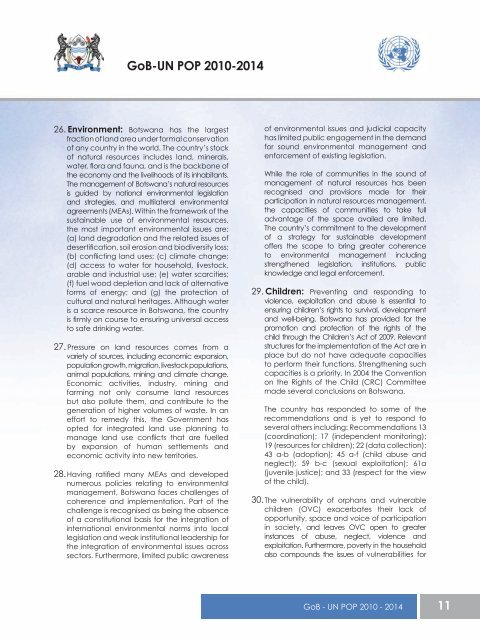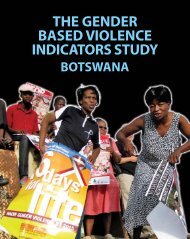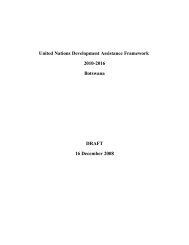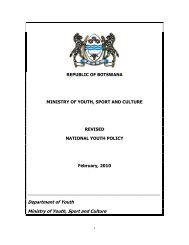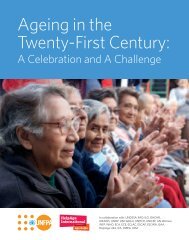GoB-UN POP 2010-2014 - UNFPA Botswana
GoB-UN POP 2010-2014 - UNFPA Botswana
GoB-UN POP 2010-2014 - UNFPA Botswana
- No tags were found...
You also want an ePaper? Increase the reach of your titles
YUMPU automatically turns print PDFs into web optimized ePapers that Google loves.
<strong>GoB</strong>-<strong>UN</strong> <strong>POP</strong> <strong>2010</strong>-<strong>2014</strong>26. Environment: <strong>Botswana</strong> has the largestfraction of land area under formal conservationof any country in the world. The country’s stockof natural resources includes land, minerals,water, flora and fauna, and is the backbone ofthe economy and the livelihoods of its inhabitants.The management of <strong>Botswana</strong>’s natural resourcesis guided by national environmental legislationand strategies, and multilateral environmentalagreements (MEAs). Within the framework of thesustainable use of environmental resources,the most important environmental issues are:(a) land degradation and the related issues ofdesertification, soil erosion and biodiversity loss;(b) conflicting land uses; (c) climate change;(d) access to water for household, livestock,arable and industrial use; (e) water scarcities;(f) fuel wood depletion and lack of alternativeforms of energy; and (g) the protection ofcultural and natural heritages. Although wateris a scarce resource in <strong>Botswana</strong>, the countryis firmly on course to ensuring universal accessto safe drinking water.27. Pressure on land resources comes from avariety of sources, including economic expansion,population growth, migration, livestock populations,animal populations, mining and climate change.Economic activities, industry, mining andfarming not only consume land resourcesbut also pollute them, and contribute to thegeneration of higher volumes of waste. In aneffort to remedy this, the Government hasopted for integrated land use planning tomanage land use conflicts that are fuelledby expansion of human settlements andeconomic activity into new territories.28. Having ratified many MEAs and developednumerous policies relating to environmentalmanagement, <strong>Botswana</strong> faces challenges ofcoherence and implementation. Part of thechallenge is recognised as being the absenceof a constitutional basis for the integration ofinternational environmental norms into locallegislation and weak institutional leadership forthe integration of environmental issues acrosssectors. Furthermore, limited public awarenessof environmental issues and judicial capacityhas limited public engagement in the demandfor sound environmental management andenforcement of existing legislation.While the role of communities in the sound ofmanagement of natural resources has beenrecognised and provisions made for theirparticipation in natural resources management,the capacities of communities to take fulladvantage of the space availed are limited.The country’s commitment to the developmentof a strategy for sustainable developmentoffers the scope to bring greater coherenceto environmental management includingstrengthened legislation, institutions, publicknowledge and legal enforcement.29. Children: Preventing and responding toviolence, exploitation and abuse is essential toensuring children’s rights to survival, developmentand well-being. <strong>Botswana</strong> has provided for thepromotion and protection of the rights of thechild through the Children’s Act of 2009. Relevantstructures for the implementation of the Act are inplace but do not have adequate capacitiesto perform their functions. Strengthening suchcapacities is a priority. In 2004 the Conventionon the Rights of the Child (CRC) Committeemade several conclusions on <strong>Botswana</strong>.The country has responded to some of therecommendations and is yet to respond toseveral others including: Recommendations 13(coordination); 17 (independent monitoring);19 (resources for children); 22 (data collection);43 a-b (adoption); 45 a-f (child abuse andneglect); 59 b-c (sexual exploitation); 61a(juvenile justice); and 33 (respect for the viewof the child).30. The vulnerability of orphans and vulnerablechildren (OVC) exacerbates their lack ofopportunity, space and voice of participationin society, and leaves OVC open to greaterinstances of abuse, neglect, violence andexploitation. Furthermore, poverty in the householdalso compounds the issues of vulnerabilities for<strong>GoB</strong> - <strong>UN</strong> <strong>POP</strong> <strong>2010</strong> - <strong>2014</strong> 11


